Tesla caught the automotive world napping when it burst on to the scene in 2012 with the Model S. The US electric car start-up demonstrated that there was a serious appetite for EVs with a premium price tag, and ever since then car makers around the world have been frantically developing competitors to cash in on this increasingly lucrative market.
The Ford Mustang Mach-E is one of them, and also one of the most important new Fords that we have seen for a generation. Its significance is demonstrated by the Mustang name that Ford has bestowed it with – one of the most recognisable in the industry.
- SEE MORE Best electric cars to buy 2021
To put this crucial new electric crossover to the test, there’s only one car for the job: the Tesla Model 3. A former Auto Express Car of the Year, the baby Tesla sets the benchmark when it comes to premium, desirable and attainable electric motoring.
In Standard Range Plus guise, the Model 3 matches the Mustang Mach-E RWD Standard Range for power, range and price. Both cars develop around 265bhp, they can cover up to 270 miles on a single charge, and a little over £3,000 separates them on price. Let’s see which one comes out on top.
Ford Mustang Mach-E
The Mustang Mach-E is a bold move into the world of electric vehicles from Ford. This RWD Standard Range model represents the entry point to the line-up, and is priced from £37,305 (including the Plug-in Car Grant). But can it take down a former Auto Express Car of the Year in the Tesla Model 3?
Design & engineering
It’s called a Mustang, but this 2,000kg electric crossover has next to nothing in common with the iconic sports car that bears the same name. It uses a dedicated EV platform that is able to accommodate a range of battery sizes, starting with a 75kWh unit and topping out with a 98kWh battery. Rear and four-wheel-drive versions are available, too.
Proportionally, the Ford is the bigger of the two cars here. It’s fractionally longer than the Tesla at 4,713mm and a little wider, but the crossover body also means that at 1,625mm, it’s 182mm taller. However, Ford has employed a clever design trick by blackening the top sections of the C-pillars in an attempt to trick you into thinking it looks more athletic and sleeker than it actually is. Mind you, this is less effective when the car is painted black.
There are some other unusual design touches, such as the door handles, or lack of them. Ford has replaced them with a small button that pops open the door when you touch it. You then grab the pillar-mounted handle to swing the door open.
The main benefit of this, apart from puzzling unsuspecting passengers, is an improvement in aerodynamic efficiency, because less wind turbulence is created down the side of the car as you travel. Better aerodynamics mean better range, which is the holy grail for an electric car.
The RWD Standard Range model we have here uses a single 265bhp electric motor and the smaller 75kWh battery. Ford claims up to 273 miles should be achievable on a single charge, which is almost identical to what the equivalent Tesla can muster. A maximum charging rate of 115kW means that the fastest possible battery top-up will take 38 minutes.
Driving
The instant hit of torque you get from an electric car can often define the driving experience, but the performance served up by the Mustang Mach-E feels more pedestrian than potent. Ford says 0-62mph takes 6.9 seconds, which is far from slow, but up against the Tesla there’s a notable gulf in performance, despite both cars packing similar amounts of power.
An extra 168kg of weight certainly counts against the Mustang here, and off the line the Ford feels more lethargic. Once up to speed the Mach-E is eager to pile on the pace, but there still isn’t enough grunt to keep up with the Tesla.
The Ford counters this with better steering and body control. Despite its lofty driving position and tall body, the Mach-E rolls less than the Model 3 through the corners. The steering is also sharper and, while not exactly brimming with feedback, it communicates what the front wheels are doing a lot more clearly than in the Tesla. On the road, it means that the Ford feels more secure during quicker changes in direction and is more comfortable with being driven at a faster pace.
That ultimately results in a more entertaining and engaging car to drive, because you feel more involved in what the car is actually doing. Being rear-wheel drive also gives the Ford a sense of agility, and while it stops short of wild power slides, you can overwhelm the rear axle and adjust your line through a corner using the throttle. The Model 3 feels quite blunt by comparison.
The Mustang Mach-E’s ride is firm but controlled, and the damping rounds off bumps and ripples in the roads a lot more effectively than the Tesla’s set-up.
Practicality
The main benefit of a dedicated electric vehicle platform, such as the one used by the Mach-E, is the space that it frees up in the cabin. The floor of the Mustang is completely flat, so sitting three adults in the back is no trouble because there’s no transmission tunnel running down the centre to rob the rear of foot space. The crossover body also means good headroom throughout.
The 402-litre boot is perhaps a little on the small side, given the size of the Mach-E, but there are an additional 81 litres of storage in the nose of the car. It even comes with a handy divider to help keep items secure while you’re driving. There’s also
some additional storage under the boot floor for charging cables to keep the load area clear.
Ownership
Nobody sells more vehicles in the UK than Ford, but owners ranked the firm 24th in our 2020 Driver Power satisfaction survey. Ford’s three-year/60,000 mile warranty is fairly standard across the industry, too.
The level of standard safety kit is generous across the Mach-E line-up. All models come equipped with lane-keep assist and lane-departure warning, automatic emergency brake, forward-collision warning, evasive-steer assist and pre-collision assist.
Running costs
Our experts predict that the Mach-E will hold on to 54 per cent of its value after three years and 36,000 miles. That means the RWD Standard Range model will be worth £20,145 after that period.
On our test the Mach-E averaged a decent 3.5mi/kWh, meaning that 238 miles on a full charge is realistic. Based on the average cost of a kWh of energy being 16.3p, charging the Mach-E will cost in the region of £12.20 from a home wallbox.
Using a domestic power supply to top up the battery will take 21 hours and 45 minutes, but owners are almost certain to have a faster 7kW wallbox charger, which reduces this to 11 hours.
Testers’ notes
“You wouldn’t say the Ford feels premium inside, but the materials and build quality are solid throughout and feel more durable than those in the Tesla.”
Tesla Model 3
The Model 3 Standard Range Plus is the entry point to Tesla ownership. At £40,490, it’s slightly more expensive than the Ford, but it does offer more performance and slightly better range. Is that enough for Tesla to remain our EV champ?
Design & engineering
As with the Ford, the Model 3 is based on a dedicated electric vehicle platform, with the battery mounted between the axles beneath the floor of the car. That helps give the Model 3 a low centre of gravity to improve handling.
The Tesla’s 55kWh battery is 20kWh smaller than the Ford’s. However, the Model 3 is shorter and lower than the Mach-E and it’s also lighter by 168kg, so despite the smaller battery, its official 278-mile range exceeds that of the Ford by five miles.
The Model 3 is also more powerful; the single electric motor mounted on the rear axle develops 271bhp versus the Ford’s 265bhp. Combine that with the lower weight, and the Tesla is also significantly quicker; 0-62mph takes a claimed 5.6 seconds.
It’s also the faster car to fully recharge. Using a domestic power supply, it takes 16 hours compared with the Ford’s 21 hours and 45 minutes. Another boon for the Model 3 is the ability to use Tesla’s Supercharger network, which offers a 250kW charging rate and means a 10-80 per cent top-up only takes 15 minutes.
Tesla’s approach to updating its cars means buyers get free ‘over-the-air’ software upgrades (although the Mach-E also offers this). However, there are physical upgrades as well, and the Model 3 now features a more efficient heat pump that reduces the impact on range when you have the heating on in colder months.
There have also been some updates inside, with Tesla replacing the clunky flip lid on the centre console with a wireless charging pad for a pair of smartphones. A lot of the car’s easily scratched piano-black surfaces have also been replaced with a more durable grey finish that also looks better.
Driving
It’s the smallest car in Tesla’s range, but the Model 3 Standard Range Plus still packs plenty of punch. The firm says 0-62mph takes 5.6 seconds, which is fast hot-hatch territory, but on the road it seems even quicker, thanks to that immediate and sustained slug of torque as soon as you hit the throttle. It feels noticeably faster than the Ford off the line.
Perhaps more impressive is the Model 3’s mid-speed acceleration. Squeeze the throttle at 30mph and the Tesla leaps forward with real energy, allowing you to swiftly overtake slower traffic.
At lower speeds and around town the Tesla is relatively refined and composed, with a very well integrated ‘one-pedal’ driving function that brings the Tesla to a stop without the sharp feeling of deceleration you get in other EVs.
The suspension is soft, but the damping doesn’t do a great job of isolating bumps. The 19-inch wheels thud into potholes, and if you hit a stretch of bad tarmac you can hear the suspension working overtime as it struggles to control the car’s mass.
The weakest area of the Tesla, however, is the steering. It’s fast and instills the car with a real sense of agility, but there is no sense whatsoever as to what the front wheels are actually doing or how much grip they have. The Model 3 is very quick and darty but feels quite numb to drive and less engaging than the Ford.
Practicality
The Tesla trumps the Ford when it comes to carrying capacity, serving up a 425-litre load bay. But because it’s a saloon, the opening and actual space aren’t as useful as the Ford’s. You do get an under-floor storage area to keep the charging cables out of sight, though.
As with the Ford, there’s also an additional luggage area in the nose of the Tesla, and it can easily accommodate a couple of small bags.
While the saloon body compromises boot space, there’s still a good amount of passenger space inside the Model 3. The gradually sloping roofline means headroom is pretty generous, and the full panoramic roof that stretches the full length of the car makes it feel incredibly light and airy, and more spacious overall than the Ford.
Ownership
You only need to look online to see how highly Tesla customers rate their vehicles. Not enough owners filled in our annual Driver Power satisfaction survey to rank in 2020, but the company does offer a four-year/50,000-mile warranty, while the battery is covered for eight years or 120,000 miles.
Tesla’s Autopilot function comes as standard, enabling the car to steer, accelerate and brake automatically within its lane when activated. You can upgrade to Enhanced Autopilot for £3,400, which adds functions such as being able to merge with traffic on and off slip roads, automatic lane change and a ‘summon’ function that allows you to remotely move the car back and forth to make access easier if necessary.
Running costs
Whether you buy with cash or lease on a monthly PCP deal, the Tesla Model 3 is the more expensive of the two cars here to the tune of £3,140, or £90 per month.
However, the Model 3 does have better residual values, with our experts predicting it’ll retain 57 per cent of its value over three years and 36,000 miles, compared to the Mach-E’s 54 per cent. It means that the Tesla’s higher purchase price is almost completely offset because it’ll be worth £23,079 against the Ford’s £20,145 after that initial three-year period.
On our test the Tesla returned an average of 3.4mi/kWh; based on that average, a fully charged battery will return 170 miles, which is some way short of the 271 miles claimed by Tesla.
Testers’ notes
“One of the biggest attractions of owning a Tesla is the ability to access the Supercharger network (right). It’s the most reliable and fastest charging system available.”
Verdict
First place: Ford Mustang Mach-E
The name is contentious, but there’s no denying that the Mustang Mach-E is a well rounded, practical and attractively priced EV. It can’t match the Tesla’s straight-line performance, but the ride, handling and chassis balance are all superior, and in our hands had a longer range, too. Add in a generous kit list and the fact that the Ford is £90 cheaper per month on a PCP deal, and the Mustang takes the victory.
Second place: Tesla Model 3
The Tesla badge and on-board tech carry kudos with some buyers, but the Model 3 is outshone here. It’s blisteringly quick, but up against the Ford its shortcomings on ride and handling are highlighted. Access to Tesla’s Supercharger network makes the idea of Model 3 ownership very appealing, but the overall package and price aren’t a match for the Ford on this occasion.
Also consider...
Polestar 2
- Price: £46,900
- Engine: 78kWh battery, 402bhp
To many people Polestar will be a bit of an unknown, but the 2 is an excellent EV that packs great performance and a usable range in a jacked-up body. Unlike its rivals, the 2 is AWD only with a motor on both axles, and has a single 75kWh battery option. In the real world it’s good for around 245 miles on a single charge, while 0-62mph takes a claimed 4.7 seconds.
Jaguar I-Pace
- Price: £65,195
- Engine: 84.7kWh battery, 394bhp
The I-Pace is on the pricey side when compared with the Ford and Tesla here, but you can see where that money has been spent because cabin quality is first rate. However, what really makes the Jaguar stand out is just how good it is to drive, with sharp steering and excellent body control for such a heavy car. Its real-world range is around 225 miles.
Figures
| Ford Mustang Mach-E Standard Range | Tesla Model 3 Standard Range Plus | |
| On the road price/total as tested | £37,305/£37,305 | £40,490/£43,860 |
| Residual value (after 3yrs/36,000) | £20,145/54.0% | £23,079/57.0% |
| Depreciation | £17,160 | £17,411 |
| Annual tax liability std/higher rate | £0/£0 | £0/£0 |
| Annual electricity cost (12k/20k miles) | £559/£931 | £575/£959 |
| Insurance group/quote/road tax cost | 33/£689/£0 | 48/N/A/£0 |
| Servicing costs | N/A | N/A |
| Length/wheelbase | 4,713/2,984mm | 4,694/2,875mm |
| Height/width | 1,625/1,881mm | 1,443/1,933mm |
| Powertrain | Single electric motor/lithium-ion battery | Single electric motor/lithium-ion battery |
| Peak power | 265bhp | 271bhp |
| Peak torque | 430Nm | 404Nm |
| Transmission | Single-speed auto/rwd | Single-speed auto/rwd |
| Battery capacity/usable | 75/68kWh | 55/50kWh |
| Boot capacity (seats up/down) | 402/1,420 litres | 425 litres/N/A |
| Kerbweight/payload/towing capacity | 1,993/637/750kg | 1,825/389/1000kg |
| Turning circle | 11.6 metres | 11.8 metres |
| Basic warranty (miles)/recovery | 3 years (60k)/N/A | 4 years (50k)/4 years |
| Driver Power manufacturer/dealer pos | 24th/23rd | N/A |
| NCAP: Adult/child/ped./assist/stars | N/A | 96/86/74/94/5 |
| 0-62mph/top speed | 6.9 secs/112mph | 5.6 secs/140mph |
| Auto Express economy (miles/kWh) | 3.5mi/kWh | 3.4mi/kWh |
| Auto Express predicted range | 238 miles | 170 miles |
| Claimed range (WLTP) | 273 miles | 278 miles |
| Charging capability | 3.7kW/11kW/115kW | 3.7kW/11kW/120kW |
| Charging time | 21hrs 45min/7hrs 30min/38min | 16hrs/5hrs 30min/34min |
| Actual/claimed CO2/tax bracket | 0/0g/km/0% | 0/0g/km/0% |
| Airbags/Isofix/park sensors/camera | Yes/yes/yes/yes | Yes/yes/yes/yes |
| Auto lane-keep/blind spot/AEB | Yes/yes/yes | Yes/yes/yes |
| Climate/cruise/leather/heated seats | Yes/adaptive/yes/yes | Yes/adaptive/yes/yes |
| Metallic/LEDs/keyless go/pwr tailgate | £800/no/yes/no | Yes/yes/yes/yes |
| Nav/digit dash/DAB/connected apps | Yes/yes/yes/yes | Yes/yes/yes/yes |
| Wireless charge/CarPlay/Android Auto | Yes/yes/yes | Yes/no/no |
from Sitewide RSS feed https://bit.ly/3rNTCOe
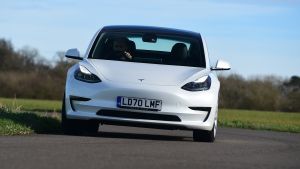
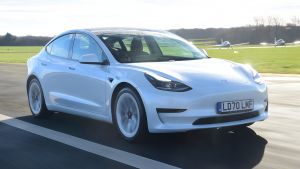
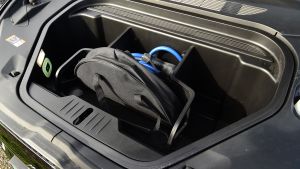
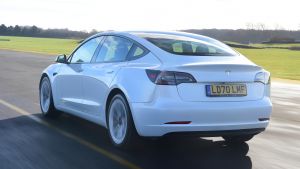
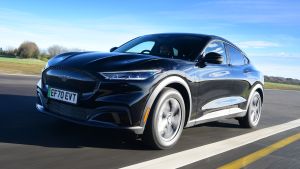
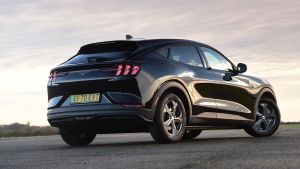
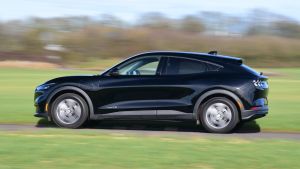
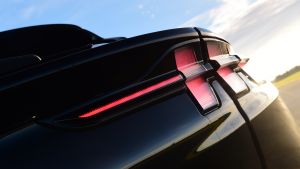
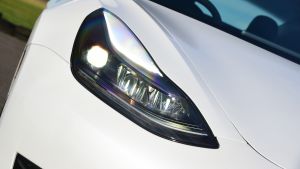
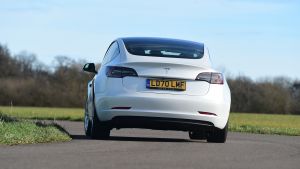
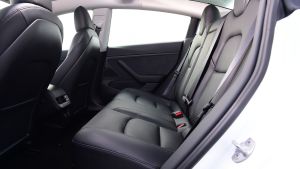
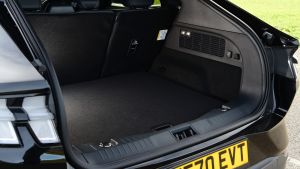
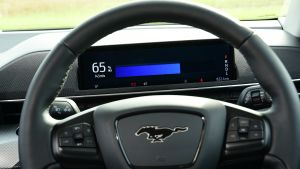
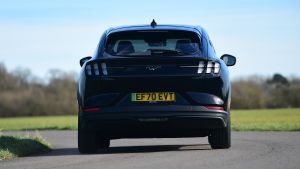
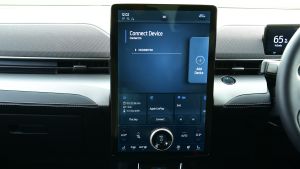
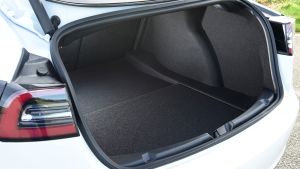
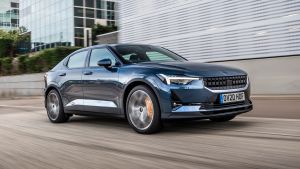
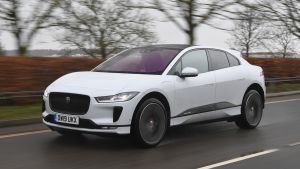
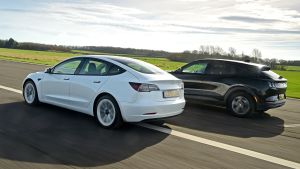
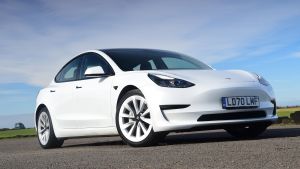
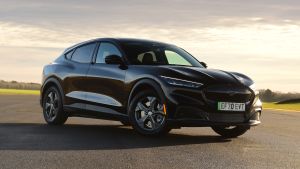
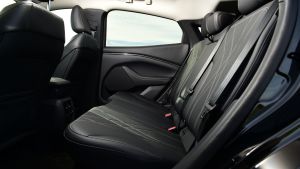
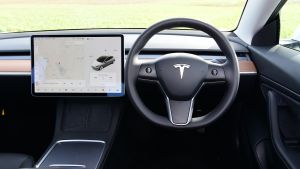
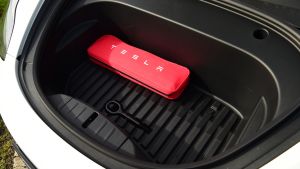
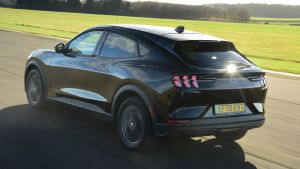
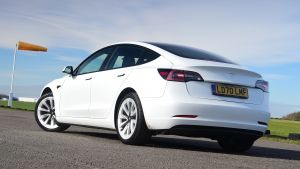
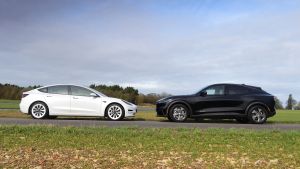
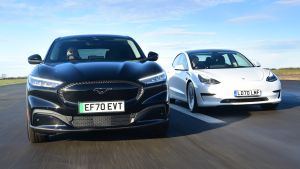
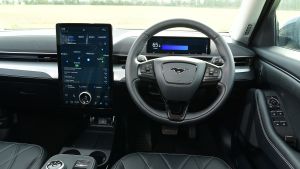
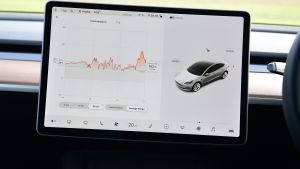
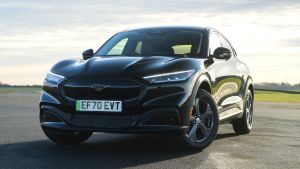
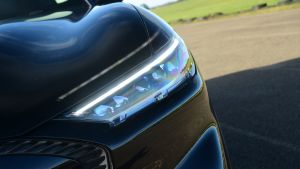
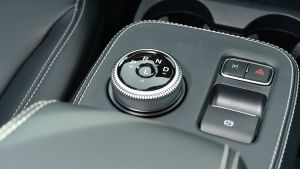
Comments
Post a Comment